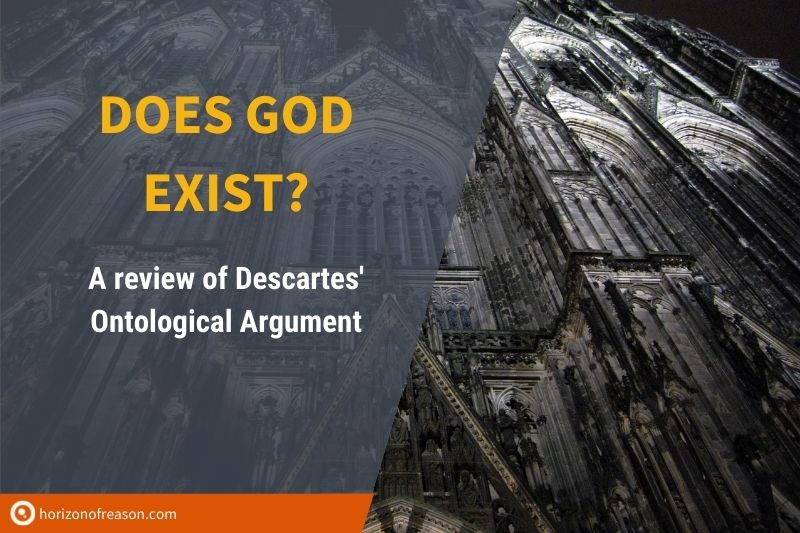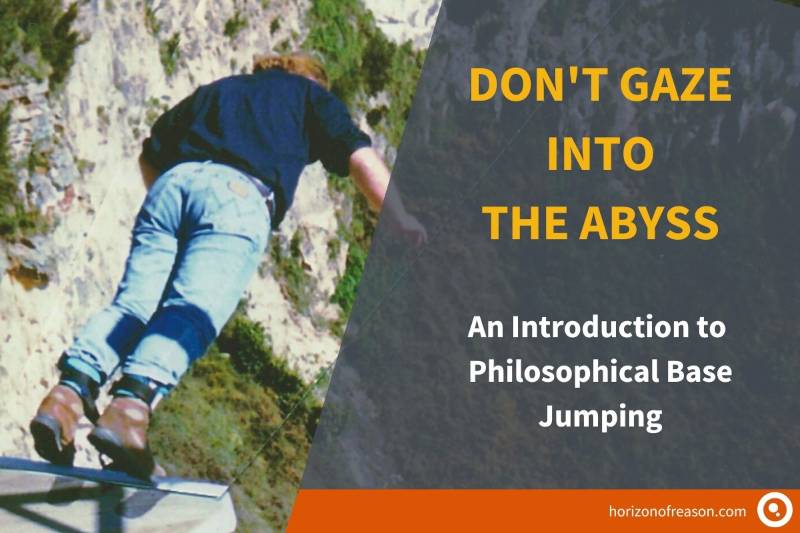
Does God Exist? A review of Descartes' Ontological Argument

Peter Prevos |
2677 words | 13 minutes
Share this content
The dictum ‘cogito ergo sum' (I think therefore I am)—which Descartes established as the first principle in the Second Meditation—is by itself not a promising starting point for developing a system of knowledge. Descartes needs a further principle in order to be able to escape subjective self-awareness. He needs to be convinced that there is no Malicious Demon, deceiving us about the existence of the world and about the content of our thoughts. He provides this in proving that there is a God which is a perfect being and as such can not be a deceiver. The argument for the existence of God plays a central role in Descartes' philosophy:
And thus I see clearly that certainty and truth of all knowledge depends on cognition of the one true God. (Atque ita plane video omnis scientiae certitudinem & vertitatem ab unâ veri Dei cognitione pendere)
Descartes presents two distinct proofs for the existence of God in the Third and Fifth Meditation. In this paper I will discuss the proof employed in the Fifth Meditation, the so called ontological argument.
The Ontological Argument
Descartes' starting point is the recognition that he has innate ideas. He admits that although these ideas might not correspond with something actually existing in the material world, the ideas themselves can not be ignored. Descartes thus finds in himself the idea of God as a supremely perfect being and the understanding that it belongs to his nature that he exists.
Nevertheless from the fact that I am not able to think of God except as existing, it follows that existence is inseparable from God, and consequently that he actually exists (Atqui ex eo quòd non possim cogitare Deum nisi existentem, sequitur existentiam a Deo esse inseparabilem, ac proinde illum reverà existere).
Descartes does not use the masculine third person pronoun ‘he', as it is implied in the third person conjugations of the Latin verbs. The feminine and neuter pronouns ‘she' and ‘it' are thus also implied when the pronoun ‘he'—which is the customary translation—is used in this paper
This formalised version of the ontological argument standard associated with Descartes is:
- I have an idea of supremely perfect being, i.e. a being having all perfections;
- Necessary existence is a perfection;
- Therefore, a supremely perfect being exists.
The existence of God can, according to Descartes, no more be separated from his essence than the fact that the sum of the angles of a triangle equals the sum of two right angles can not be separated from the essence of a triangle. Although some might argue that this is only the case in Euclidean geometry, the principle would be equally true if Descartes had known and used hyperbolic or spheric geometries, where the sum of the angles is more or less than the sum of two right angles.
Descartes pre-empts the objection that just thinking about something doesn't make it so by arguing that the idea of a supremely perfect being implies existence: “… apart from God, there is nothing else of which I am capable of thinking such that existence [necessarily] belongs to its essence”.
The two proofs for the existence of God both start from the same innate idea of God as a supremely perfect being. The argument of the first proof is basically that the idea of a perfect being can only be caused by a perfect being and because Descartes does not think he is a perfect being, the idea of God must be caused by God.
Descartes needs a second argument to strengthen his case of the existence of God, the second proof does not play a special role in his philosophy. Descartes seems to have considered the two arguments to be equally and independently valid.
He needs to strengthen his argument for the existence of God because it is an extremely important aspect of his philosophy as it is the only way out of subjective self-awareness.
Objections & Replies
One of the major objections to the ontological argument relates to the question whether God's essence implies his existence. In the Fifth Objections the objector argues that ‘if a thing lacks existence, we do not say it is imperfect, or deprived of a perfection, but say instead that it is nothing at all' and that we can just as easily place existence among the perfections of a triangle.
One could for example have the idea of a winged horse, which essence is that it exists—Cottingham calls this imaginary being ‘Superpegasus'. This so called ‘overload' objection undermines the credibility of the argument because if the ontological argument is valid, it would fill the universe with all sorts of fantastic beings whose essence includes their existence.
Descartes' reply to this objection is that only some of our ideas correspond to true and immutable natures, other ideas depict fictitious or invented natures which are put together by the intellect. The idea of the existence of God is in this special category of being true and immutable; the idea of a winged horse is according to Descartes a composite idea and the property of necessary existing can easily be split off. The existence of God can according to Descartes however not be thought of separately from the idea of God and he therefore necessarily exists.
We can not produce ontological arguments for finite thoughts because the clear and distinct ideas of them contain merely dependent existence. Actual existence is only demanded by the idea of God.
Descartes' argument is however not convincing because even imaginary beings can have essential properties which can not be split off by the mind. This line of thinking implies that we have to allow objects like Superpegasus which leaves Descartes argument open to the overload objection.
The Ontological Argument
The ontological argument can be objected against from two directions. The objections by Descartes' contemporaries are mainly aimed at formal aspects of the argument. The argument can also be criticised because the first premise is based on the theological assumption that God is a perfect being.
Descartes' idea of God is based on the Catholic interpretation of the nature and attributes of God. This assumption is certainly not beyond doubt, because it not necessarily true that God is a perfect being. In the Gnostic version of early Christianity for example it was believed that the world and our bodies were created by an incompetent lesser god.1 Descartes also supposes that only one God exists, something which can be easily doubted by a polytheistic philosopher.
Descartes seems to take the theological position of the Catholic Church for granted—something which was probably wise in the latter days of the counter-reformation. In a letter to his friend Marin Mersenne (1588–1648), with whom Descartes studied at the Jesuit College of La Flèche, he expresses fear of the inquisition and decides not to publish his work Le Monde (The world) as it supported the theories of the recently condemned Galileo Galilei (1564–1642).2
The argument for the existence of God is thus not convincing which has great implications for the Descartes' philosophical project. Without knowledge of God Descartes remains in the whirlpool of doubt he has thrown himself into in the First Meditation and can not know anything except that he exists.
Comments by Aubrey Townsend
Your sketch of the role of the proofs of God's existence is a little naive: it accepts at face value remarks that Descartes makes at the end of Meditation Five where for tactical reasons Descartes is concerned to emphasise the importance of God in his system. But when one looks at the serious content of the argument a rather different position emerges.
The Cogito is genuinely central to both the epistemological and metaphysical strands of the Meditations. As regards epistemology it provides the basis for the introduction of clear and distinct perception, and here early in Meditation Three a doubt surfaces which Descartes describes as slight and metaphysical, that a deceiving god may have created us with cognitive capacities that are inadequate for knowledge strictly conceived. The proofs of God's existence are aimed at removing this slim remaining doubt. But the proofs themselves rely on clear and distinct perception, so the circularity worry emerged.
Descartes' response to that in the reply to Objections Two further diminishes the role of God at the heart of the epistemological program. Also there is a problem about the argument for God's existence offered in Meditation Three. It had several roles to play in Descartes' argument. It provides the occasion for developing the machinery of ideas used later in the arguments of Meditation six, and as often with Descartes first deploys them in a theological context where Descartes hoped they might be well received.
The argument presented there is basically an argument to best explanation of the sort used in science; Descartes was anxious to show how the scientific form of argument that the Church had recently criticised pervades our knowledge and the style of objection brought against it by the Church would also be damaging to theology.
So it is an argument that invites suggestions about alternative explanations. This is further highlighted in the Fourth Meditation where Descartes' account of how error is possible introduces the suggestion that the human will is infinite in something like the way God's will and power are, thus providing an alternative model for the origin of the idea of infinity that was crucial to the first proof. I think it is doubtful whether Descartes thought the first proof really was as compelling as he suggests; indeed I think that the Ontological argument was the one he regarded as most compelling. But this argument is introduced by remarks about clear and distinct perception that suggest that Descartes did not at this stage in the Meditations think the metaphysical doubt of Meditation 3 was still alive.
The Ontological Argument
Your exposition here is very good and makes points commonly missed by students. I do, however, think a bit more needs to be said about the discussion in Meditation 5 that leads up to the argument, the discussion of real and immutable natures, for this is crucial to Descartes' form of the argument and what distinguishes it from that of Anselm. These were points missed by most of Descartes' early critics.
The key to understanding Descartes' argument is to understand the point of the remarks about mathematics that lead into it. Notice what Descartes claims about mathematical objects and our knowledge of them: they are in some sense real entities ('not nothing') though it may be that no such things exist in actuality. Our knowledge of them is knowledge of real and immutable essences, not something that we invent but something that we discover. To use concepts that Descartes did not clearly have, he would have claimed that in mathematical knowledge we are presented with a priori synthetic truths about possible objects. And the test for this is our ability to prove significant non-verbal truths about them. By contrast, he would say, Pegasus the flying horse, does not have a real and immutable essence, there are no truths about such a being that are not just a consequence of our definition and truths about horses and flying objects. He would have relied on these points to rebut objections like that of Cottingham that Descartes' argument threatens to overpopulate the world with strange entities like Superpegasus.
Of course to use all of this to get an argument for the existence of God, Descartes has to claim that God belongs with mathematical objects as things about which we have knowledge of significant non-analytic truths. The argument for this claim is barely hinted at and this may be a point for criticism to focus on. But if we allow this point then what Descartes is claiming is that, with respect to God, it 'belongs to his nature that he always exists', or in the French text, that 'actual and eternal existence belongs to his nature'. Two points are crucial here. First, Descartes is not making a point about what we mean by 'God' but a point about his nature as we apprehend it. The second point emerges with the claim about eternal existence, for this later becomes important in the replies.
On why Descartes needed the second proof, what you say is plausible and I guess the common view. You will gather from my earlier remarks that I have some doubts about this. The argument in Meditation Three is very complex and even if every step in it is secured by clear and distinct perception - a very doubtful point – it is not one that one might think of as graspable by a simple intuition. At best it is like a complex mathematical proof. But Descartes claimed in Meditation Five that the proof of the existence of God was needed to deal with a problem that arises where we have to rely on complex proofs that we might forget and cannot hold before the mind as a whole. So he may have thought that the ontological argument was needed to give a proof which, like the cogito, can be grasped in a single intuition.
Objections and Replies
Again what you say is very good and demonstrates some depth of understanding. I think though that you have concentrated too much on one part of the criticism levelled in Objections Five and in the process miss some key points in Descartes' reply. The remarks that follow explore some of the philosophical depth that is to be found in Descartes' reply.
The crucial points emerge from the discussion of the objection that existence is not a property or a perfection. Here Descartes has an important and interesting point to make, but one which he lacked the conceptual resources to get really clear.
The point is that what belongs to God's essence is not just existence but necessary and eternal existence, and this he claims can be regarded as a property and a perfection that avoids Gassendi's objection. Let me try to make the point is a way that Descartes could not have done. Start with eternal existence. Imagine somebody who claimed that although God once existed he does not now exist. Descartes would plausibly say that such a person was saying something that could not be true.
God is a being such that if he exists at any time then he exists at every time. You cannot say that an eternal being once existed but does so no longer. Now consider necessary existence: Descartes needs a point that mirrors that about times, namely if it is possible that a necessary being exists then it must actually exist. That point can be made with the help of modern modal logic. A necessary being is one that exists in every possible world. If such a being exists in some possible world, i.e. if God's existence is possible, then there exists a being who exists in every possible world. So if God is possible he must be actual.
If I am right Descartes' argument needs two stages. The first is an argument to the conclusion that god is a possible being; the second is an argument from possibility to actuality. Descartes thought that the first part of the argument was provided by the stuff on real and immutable essences, and that I think is where he went wrong; the second part is provided by the ontological argument as such, not an argument from definition to existence but an argument from possibility to actuality. Descartes liked such arguments; he used another such in arguing for the real distinction between body and mind in Meditation 6. And the outcome of the discussion may well be that if by God we understand a necessary being, as the Christian theological tradition did, then either God's existence is necessary or it is impossible. That seems to me a profound and interesting idea.
Notes
Share this content


